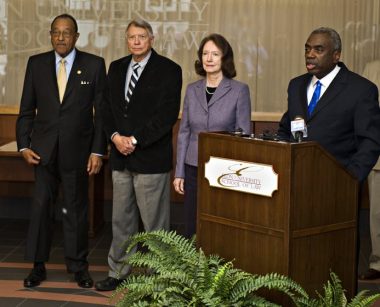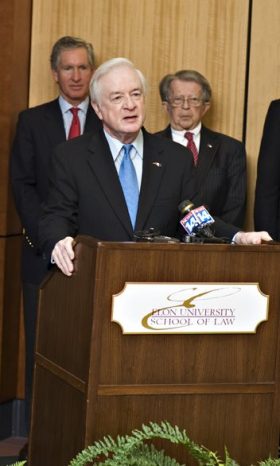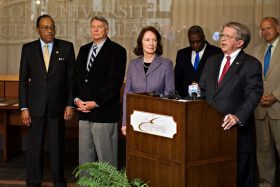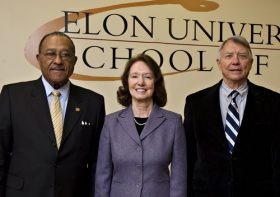Elon University School of Law has announced the creation of the Billings, Exum & Frye National Moot Court Competition, named in honor of three distinguished North Carolina lawyers, each of whom has served as Chief Justice of the Supreme Court of North Carolina and now serves as a member of the Elon University School of Law National Advisory Board.

George R. Johnson, Jr., dean of the law school, said the annual competition will commemorate the high standard of leadership, professionalism and service that the three justices have exhibited throughout their careers.
“We are honored that justices Billings, Exum and Frye have agreed to have Elon Law’s national moot court tournament bear their names,” Johnson said. “The tournament will honor them, reflecting their leadership, professionalism, and service to the profession and to the greater society.”
The inaugural Billings, Exum & Frye National Moot Court Competition will take place in the spring of 2011 at Elon University School of Law in Greensboro, North Carolina.
Former North Carolina governors, James E. Holshouser and James B. Hunt, both members of Elon Law’s National Advisory Board, highlighted the important contributions that justices Billings, Exum, and Frye have made to the State of North Carolina, as well as the impacts that a moot court tournament named in their honor could have in legal education.

“I don’t believe there is any state in America that has three former chief justices of the Supreme Court that are deeply involved in the leadership of a law school, with a moot court competition named for them,” said Hunt. “Justices Billings, Exum, and Frye have not only shown great leadership in our courts, they have shown great leadership in the legal profession, in their communities, and now in legal education through their contributions to the formation and development of Elon law school.”
“These three justices have been the sheer epitome of two important traits that are an important part of what Elon University School of Law is all about; they have been leaders and they have been contributors to their community,” said Holshouser. “Public service and leadership are going to be outstanding traits of Elon Law graduates, and this competition, bearing the names of three of North Carolina’s most distinguished justices, builds on that important mission at Elon Law to prepare lawyers for roles in leadership and service to society.”
David Gergen, Chair of the Elon University School of Law National Advisory Board, former presidential adviser, and director of the Center for Public Leadership at the John F. Kennedy School of Government at Harvard University, said the moot court competition is the latest contribution by the law school to legal education nationally.

“Elon continues to exceed expectations at every stage of its development, from strong bar passage and job placement rates among its charter class, to excellence in the innovative programs it offers in legal education,” Gergen said. “The addition of a national moot court competition, named for three justices of the highest distinction, is the latest example of Elon Law’s emergence as a distinguished law school contributing to the improvement of legal education nationally.”
Alan Woodlief, associate professor of law and director of the moot court program at Elon Law, said the tournament will focus on issues pertaining to constitutional law and public policy and will celebrate student excellence in oral and written appellate advocacy. Law students from across the country will be invited to participate in the tournament, competing for awards including the Chief Justices’ Cup, presented to the top performing moot court team.
“We are excited that our competition will enhance participating students’ legal education by allowing them to display their advocacy skills before panels of distinguished jurists and practicing attorneys from across North Carolina, who will judge their arguments and provide them valuable feedback,” Woodlief said. “Student members of the Elon Law Moot Court Board will play a key role in coordinating the competition, providing them with an excellent leadership and service opportunity to Elon Law and in legal education nationally.”

THE CHIEF JUSTICES
Rhoda Bryan Billings served four years as a state District Court judge, from 1968 to 1972, before beginning service on the North Carolina Supreme Court in 1985. She was appointed Chief Justice in 1986, the second woman to head the Court. Justice Billings has served as a law professor at Wake Forest University since 1977, and today is titled Professor Emeritus. She served as President of the North Carolina Bar Association from 1991 to 1992. Justice Billings earned her law degree from Wake Forest University.
James G. Exum, Jr. is an attorney at Smith Moore Leatherwood LLP and serves as Elon Law’s Distinguished Jurist in Residence, teaching courses, counseling students and coaching moot court teams. He served on the North Carolina Supreme Court from 1974 to 1994, and was Chief Justice from 1986 to 1994. Justice Exum was elected to the state House of Representatives in 1967. He also served as Resident Superior Court Judge of Guilford County. He earned his law degree from New York University.

Henry E. Frye served over 24 years in private law practice, fourteen years in the North Carolina General Assembly, ten years as president of a bank, two years as an assistant U.S. attorney, two years as a law professor, and over 17 years on the North Carolina Supreme Court. In 1983, Justice Frye became the first African-American to serve on the North Carolina Supreme Court. He was appointed Chief Justice of the Court in 1999. Justice Frye earned his law degree from the University of North Carolina at Chapel Hill.
Click here for more information about Elon University School of Law’s moot court program.


